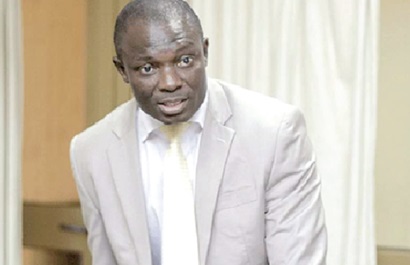
‘Breaking the 8’: Focus on addressing challenges - MP urges NPP
The New Patriotic Party (NPP) Member of Parliament (MP) for Obuasi West, Kwaku Kwarteng, has asked the party to focus on breaking the political norm of bad leadership and economic mismanagement if the party wants to break the eight-year electoral cycle.
He said ‘breaking-the-8’ required the party to first acknowledge the past and present failures of the political class “to provide the kind of quality leadership required to avert the mess in which we find our country today.”
He added that the NPP must adopt deep and far-reaching reforms to address the decades of bad politics and economic mismanagement to stand a chance of ‘breaking-the-8’.
“We must convince voters that we shall be ruthless in our determination to fix this country, that we shall stay the course no matter the challenges, and that there shall be no sacred cows,” he stressed.
“We must address concerns about how much of our national resources we spend on ourselves as politicians, and take steps to overhaul the corrupt public procurement regime we inherited from previous governments and have continued to live with,” he said.
Mr Kwarteng observed that once the NPP led by example, “we can say with integrity to our people that we are sinking in a common boat and call all Ghanaians to duty.”
Context
Ghana's Fourth Republic has given eight years to ruling parties. Voters believe that when one political party governs for some time, they must leave for another political party to come. This view has been established by the outcome of elections since 1992, as power has alternated between the NPP and the National Democratic Congress (NDC) every eight years.
Crux of the matter
The Obuasi West MP said that voter belief was emanating from the perception that "all politicians are the same, let one go and let another come." He said the NPP’s quest to break-the-eight was an expectation coming at a time when hostile external factors had imposed considerable hardship on the average Ghanaian voter.
However, he noted that it was not just external factors that threatened the party’s chances of electoral victory. 'The economic problems Ghana is facing today, at both the national level and in households, are also the cumulative effects of many decades, spanning different governments, of the bad politics and economic mismanagement that have characterised the governance of our country,” he said.
Ponzi scheme
Mr Kwarteng added that the country had been run as a ponzi scheme because “we always offer higher interest to lenders, borrow more, use a part to repay previous debts and the rest to pay for the current year’s overspending.”
He said the economy was struggling now because lenders were refusing to lend to the country. “It is just like a Ponzi scheme going into crisis once people stop depositing their monies with them,” he said.
The MP said Ghanaians were justifiably worried that if the government continued on the path it had been walking, “our democracy will collapse, and with it, all our political parties.”
Norm
He noted that the time had come for a departure from the norm that a political party going into an election must sing praises of its past achievements and make high-sounding promises for the future.
At the same time, he said, political parties must desist from always painting their opponents in the worst possible light for electoral gains. “We have mastered this art, and in the process, we have forgotten that politics should be about the future of our children and our motherland. We have reduced election campaigns to bitter struggles between competitors seeking power for the wrong reasons,” he said.
